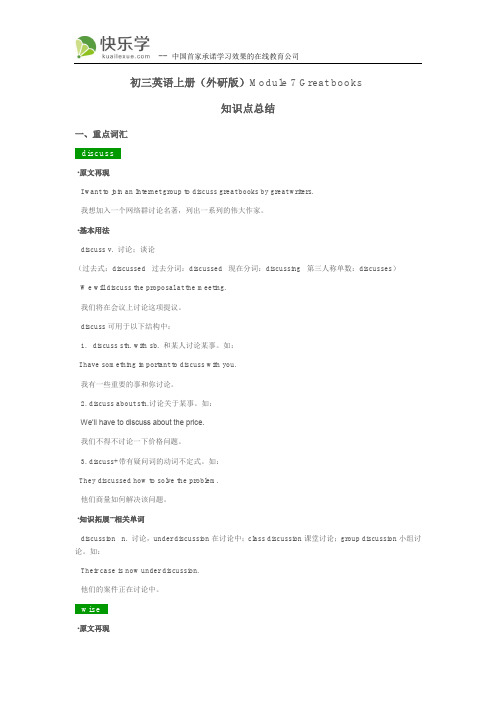外研版九年级英语上册Module 7 Great books Module7 Unit 2
- 格式:doc
- 大小:59.50 KB
- 文档页数:13
![英语外研九年级上册Module 7 Great books[Module7 Unit2]](https://img.taocdn.com/s1/m/db845bdaaff8941ea76e58fafab069dc502247f4.png)

初三英语上册(外研版)Module 7 Great books知识点总结一、重点词汇discuss·原文再现I want to join an Internet group to discuss great books by great writers.我想加入一个网络群讨论名著,列出一系列的伟大作家。
·基本用法discuss v. 讨论;谈论(过去式:discussed 过去分词:discussed 现在分词:discussing 第三人称单数:discusses)We will discuss the proposal at the meeting.我们将在会议上讨论这项提议。
discuss可用于以下结构中:1. discuss sth. with sb. 和某人讨论某事。
如:I have something important to discuss with you.我有一些重要的事和你讨论。
2. discuss about sth.讨论关于某事。
如:We’ll have to discuss about the price.我们不得不讨论一下价格问题。
3. discuss+带有疑问词的动词不定式。
如:They discussed how to solve the problem.他们商量如何解决该问题。
·知识拓展--相关单词discussion n. 讨论,under discussion在讨论中;class discussion课堂讨论;group discussion小组讨论。
如:Their case is now under discussion.他们的案件正在讨论中。
wise·原文再现He was a very wise man.他是一个很英明的人。
·基本用法wise adj. 有判断力的;明智的,在句中可以作定语,也可作表语。
如:To a wise person, time is like a diamond.时间对一个有智慧的人而言,就如钻石般珍贵。

1.学生自学生词,并记住单词拼写和拼读。
2.预习课本,找出重点短语和句式。
3.读、记后完成学案中自学导练作业。
Step 1 情景导入T:There are many famous writers and thinkers in the world. How many do you know? S1:Lu Xun is a great writer.T:You\'re right. Who else?S1:Shakespeare is a great writer.T:Do you know Confucius?S2:Yes, I do. He was a teacher, a thinker. He was also a writer.T:Today, we will learn more about them.Step 2 完成教材 Activities 1,2的任务1.Work in pairs. Look at the pictures. Say who the people are and why they are famous. Now listen and check your answers. (Activity 1) (1)教师先提供一些词汇,供学生讨论使用。
例如:great, influence, play, poem, respect, story, thinker, thought, wise, writer 等。
(2)两人一组讨论。
(3)教师点名,部分小组展示,全班反馈。
2.Listen again and complete the sentences. (Activity 2)(1)学生个体活动,听录音,完成句子。
(2)全班核对答案。
(3)如果学生程度较好的话,教师还可以让学生试着记录对话要点,并作口头反馈。
例如:Confucius: a great thinker, 2,000 years ago, well—known.Shakespeare: an Englishman, plays and poems, 400 years ago.Mark Twain: an American, stories, set in the south of the US, 100 years ago.Step 3完成教材 Activity 3 的任务1.Listen and read. Now match the people with the descriptions.(1)学生个体完成活动。


Module 7 Great booksUnit 1 We're still influenced by Confucius's ideas. Recently I’ve read a great book called Romeo and Juliet.I’m deeply moved by it.Have you ever read some great books? Who are your great writers?Look at the pictures. Say who the people are and why they are famous.Confucius was a great teacher and thinker in ancient China. He lived over 2000 years ago and he is well-known in many countries.William Shakespeare was English and wrote plays and poems. Although he died about 400 years, his plays are still seen, and his poems are still read by many people.Mark Twain was an American writer. His works are studied in schools. His stories are set in the south of the US over 100 years ago, and readers still enjoy them very much.What’s up?怎么了?是一种非正式的用法。
Well, maybe…嗯,也许…….I suppose…我想……Why don’t you…?你为什么不……?1. We’re still influenced by Confucius’s ideas.2. Shakespeare’s plays also make a lot of sense to us today.3. He was important, but I suppose he isn’t as well-known as Confucius or Shakespeare.1. What’s up?What’s up?是一种非正式的用法,意思是“怎么了/出什么事了?”例如:What’s up? You look very worried?怎么了?你看上去很焦虑。

九上Module7 Great books一、课内基础必背单词discuss [dɪˈskʌs] v. 讨论,谈论thinker [ˈθɪŋkə] n. 思想家wise [waɪz] adj. 有判断力的,明智的review [rɪˈvju:] n. 评论(文章)influence [ˈɪnfluəns] v. 影响,作用于sense [sens] n. 道理,意义,合理性suppose [səˈpəʊz] v. 猜想,推测,相信,认为well-known ['wel'nəʊn] adj.众所周知的,著名的adventure [ədˈventʃə] n. 冒险(经历)escape [ɪˈskeɪp] v. 逃离,逃脱cave [keɪv] n. 洞穴dead adj. 死的,去世的neighbour ['neɪbə] n. 邻居funeral [ˈfju:nərəl] n. 葬礼surprised [səˈpraɪzd] adj. 惊奇的,惊讶的alive [əˈlaɪv] adj. 活着的southern [ˈsʌðən] adj. 南方的state [steɪt] n. 州,邦action [ˈækʃn] n. 举止,行为,情节everyday [ˈevrideɪ] adj. 日常的,普通的dialogue ['daɪəlɒɡ] n. 对话必背短语make sense 易理解,合情理,有意义by the way 顺便提一下get into trouble 遇上麻烦run away 逃走,逃跑for a time 一小段时间,一度,一时pay for 为……付出代价经典句型1. What’s up? 怎么了?2. Well, maybe…嗯,也许……3. I suppose that…我认为……4. Why don’t you…你为什么不……5. I accept that…我同意……重点词句1.【课文原句】We’re still influenced by Confucius’s ideas, and Shakespeare’s plays also make a lotof sense to us today.【用法】influence 此处用作及物动词,意为“影响;作用于”,后接名词或代词作宾语。
Module 7 Great booksUnit 1 We’re still influenced by Confucius’s ideas.第1、2课时【学习目标】1.(知识与技能)掌握下列重点单词及短语,句子的意思及用法:(1)Words: discuss, thinker, wise, review, influence, sense, suppose, well-known.(2)Phrases: make sense, by the way, in the 19 century, as well-known as, join in.(3)Important sentences:What’s up?We’ll still influenced by Confucius’s ideas, and Shakespeare’s plays also make a lot of sen se to us today. 2.(过程与方法)基于课程改革的理念及“第二语言习得论”,培养实现人的可持续发展和人的主体精神的自我完善和发展所必需的能力和素质,运用任务型教学途径,围绕核心任务,设定小任务,开展和谐愉悦的课堂活动。
3.(情感、态度与价值观)通过学习描述过去生活,提高对英语的学习兴趣。
参加各种英语活动,克服困难,在新环境中进一步树立准确的语言学习观。
(重点难点) 掌握谈论伟人和他们的著作的基本词汇,读懂含有一般现在时的被动语态的句子,掌握一般现在时的被动语态形式和用法。
Unit 2 It’s still read and loved.第3、4课时【学习目标】1.(知识与技能)掌握下列重点单词及短语,句子的意思及用法:(1)Words: adventure, escape, cave, dead, neighbour, funeral, surprised, alive, southern, state(2)Phrases: get into trouble, run away, for a time, pay for(3)Important sentences:1. The story is set in the town of St Petersburg.2. So he always gets into trouble .3. Everyone is surprised to see them at first, but very pleased to find that they are alive.2.(过程与方法)运用任务型教学途径,围绕核心任务,设定小任务,开展和谐愉悦的课堂活动。
Module7 Unit2 Great Books
一、教学内容:It is still read and loved.
二、课型:Reading and writing
三、教学目标:
1、能够正确使用下列单词和词组:adventure, get into trouble, run away,
escape, cave, dead, for a time, neighbour, funeral, surprised, alive,
southern, state, pay for, action, everyday, dialogue
2、能够读懂介绍和评价文学作品的文章。
3、能够写一篇短文介绍和评价自己喜欢的文学作品。
4、通过了解名著及著名作家,激发学生阅读名著及了解著名作家的
兴趣。
教学重难点:
1、能够读懂对介绍和评价文学作品的文章。
并通过阅读a book review
of The Adventures of Tom Sawyer让学生掌握并运用略、精读的技巧,即略读找大意,精读搜索相关信息。
(重点)
2、能谈论自己喜爱的名著及喜欢的理由。
(难点)
四、教学准备:
课堂整体运用任务型教学模式以及阅读课“四个阶段”教学模式。
本课指导学生通过阅读获取信息,培养学生阅读技能。
在教学过程中,采用多媒体手段辅助教学,利用各种图片和习题任务贯穿整个教学过程。
因此,本节课需准备:PPT课件、挂图、录音机、课堂练习表格、奖品
五、教学过程:
七、板书设计:
Module7 Great books
Unit2 It is still read and loved
小组评价
Paragragh1&2T1 T2 T3 Paragragh3
Paragragh4
达标训练题
一、单项选择
1. A lot of trees________ around here every year, and we can enjoy
fresher air now.
A. were planted
B. are planted
C. will planted
D. are planting
2. —What languages _______ in that country?
—German and English.
A. are speaking
B. are spoken
C. speak
D. is spoken
3.—Excuse me, sir, smoking in the gas station.
—Oh, I'm really sorry.
A. doesn't allow
B. isn't allowed
C. aren't allowed Keys: 1. B 2.B 3. B
二、完成句子
1.如果你遇到麻烦,我一定站出来帮助你走出困境。
If you ______________I’ll step out and help you out.
2. 警察来时小偷已经跑了。
The thief had _____________when the policemen came.
3. 他在西班牙住过一段时期。
He lived_____________ in Spain.
4. 当然,遗失了自行车我愿意赔偿。
Of course, I'm quite willing to ______________the lost bike.
5. 司机不允许酒后驾驶。
Drivers _________________ after drinking.
6. 马克吐温被认为是一位最伟大的作家之一。
Mark Twain __________________ one of the greatest writers.
Keys: 1. get into trouble 2. run away 3. for a time 4. pay for 5.aren’t allowed to drive 6. is thought to be。